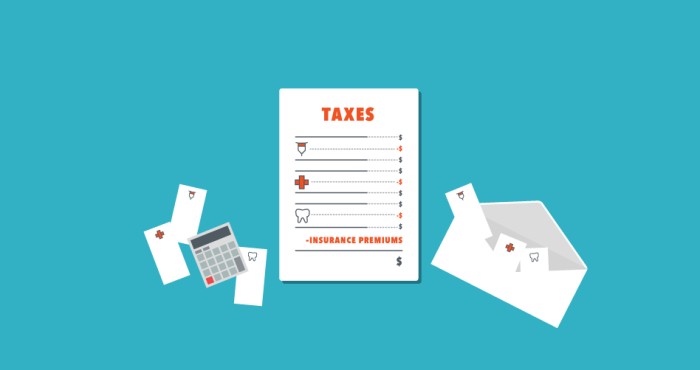Navigating the complexities of health insurance and taxes can feel like traversing a maze. The question, “Can you write off health insurance premiums?” is a common one, sparking curiosity and often confusion among individuals and families. Understanding the nuances of tax deductions related to health insurance is crucial for maximizing your financial well-being. This guide explores various scenarios, from self-employment deductions to the impact of the Affordable Care Act, offering clarity and insights into the possibilities of reducing your tax burden through health insurance premium write-offs.
This exploration delves into the intricacies of deducting health insurance premiums, covering different employment situations, account types like HSAs, and the influence of legislation like the Affordable Care Act. We’ll examine eligibility criteria, specific forms needed for filing, and practical examples to illuminate the process. By the end, you’ll possess a clearer understanding of how you might potentially reduce your taxable income through your health insurance costs.
Self-Employment and Health Insurance Deductibility

Self-employed individuals face unique challenges when it comes to securing and paying for health insurance. Unlike employees who often have employer-sponsored plans, the self-employed must cover the entire cost themselves. Fortunately, the IRS allows for a deduction of health insurance premiums, offering some tax relief for this significant expense. This deduction can significantly reduce your taxable income, resulting in a lower tax bill.
The deduction for self-employed health insurance premiums is available under Section 162 of the Internal Revenue Code, which allows deductions for ordinary and necessary business expenses. Health insurance premiums are considered a necessary expense for maintaining the health and well-being of the self-employed individual, enabling them to continue working and generating income. This deduction is available even if you are also covered under a spouse’s plan.
Eligibility Requirements
To claim this deduction, you must be self-employed and have paid health insurance premiums for yourself, your spouse, and/or your dependents. You cannot be eligible for employer-sponsored health insurance. The premiums must be for health insurance coverage that meets the minimum requirements of the Affordable Care Act (ACA). Additionally, you must be considered self-employed for tax purposes, typically meaning you operate a sole proprietorship, partnership, or limited liability company (LLC) and file Schedule C or Schedule F on your tax return.
Claiming the Deduction on Your Tax Return
Claiming the deduction involves several steps. First, gather all your health insurance premium statements and payment records for the tax year. Next, accurately calculate your total premiums paid. Finally, report this amount on your tax return using the appropriate forms and schedules.
Forms and Schedules Required
The primary form used to report self-employment income and expenses is Schedule C (Form 1040), Profit or Loss from Business (Sole Proprietorship). The health insurance premium deduction is reported as a business expense on this schedule. If you are a farmer, you will use Schedule F (Form 1040), Profit or Loss from Farming. Your total health insurance premiums are then carried over to Form 1040, your individual income tax return.
Examples of Deductible Health Insurance Premiums
Many types of health insurance premiums qualify for this deduction. These include premiums paid for individual health insurance plans purchased through the Health Insurance Marketplace or directly from an insurance company. Premiums paid for Medicare Part B and Part D are also deductible. However, premiums for long-term care insurance are generally not deductible. It’s important to consult with a tax professional if you have questions about the deductibility of specific health insurance plans.
Scenario 1: Sole Proprietor
Imagine Sarah, a freelance graphic designer operating as a sole proprietor. Throughout the year, she paid $7,200 in health insurance premiums. She will report this amount as a business expense on Schedule C, reducing her net profit and, consequently, her taxable income.
Scenario 2: Partner in a Partnership
John and Mary are partners in a small consulting firm. John paid $6,000 in health insurance premiums for himself and his family. He will report his share of these premiums on his Schedule K-1 (Form 1065), and this will be reflected in his personal income tax return.
Health Savings Accounts (HSAs) and Tax Advantages
Health Savings Accounts (HSAs) offer significant tax advantages for individuals enrolled in high-deductible health plans (HDHPs). Understanding these benefits is crucial for maximizing your savings and minimizing your tax burden. This section will detail the specific tax benefits associated with HSAs and compare them to other health savings options.
HSA contributions reduce your taxable income, effectively lowering your overall tax liability. This is because contributions are made pre-tax, meaning the money isn’t included in your gross income calculation. This is unlike many other forms of savings where you pay taxes on the money before contributing it. The tax savings are realized immediately, providing a substantial benefit, particularly for those in higher tax brackets.
HSA Tax Advantages
The triple tax advantage of HSAs is a key selling point. First, contributions are tax-deductible, reducing your adjusted gross income. Second, the money grows tax-free within the account. Third, withdrawals used for qualified medical expenses are also tax-free. This contrasts sharply with other investment accounts where gains are taxed, and sometimes withdrawals are as well. For example, consider someone contributing $3,850 to their HSA (the 2023 maximum for individuals). If this individual is in a 22% tax bracket, they save $847 in taxes ($3850 * 0.22). This is a significant immediate return on their contribution, before even considering the tax-free growth and withdrawals.
Comparison of HSA, FSA, and HRA
The tax advantages of HSAs are best understood when compared to other pre-tax health savings options. Below is a table comparing HSAs, Flexible Spending Accounts (FSAs), and Health Reimbursement Arrangements (HRAs). Each option has its own set of rules and benefits. Careful consideration of your individual needs and circumstances is crucial in determining the best fit.
| Provider | Contribution Limits | Tax Deductibility | Withdrawal Rules |
|---|---|---|---|
| Individual or Family | Annual limits set by the IRS (vary by year and family status) | Contributions are tax-deductible; earnings grow tax-free; withdrawals for qualified medical expenses are tax-free. | Withdrawals for qualified medical expenses are tax-free. Non-qualified withdrawals are subject to income tax and a 20% penalty before age 65. |
| Employer | Annual limits set by the employer | Contributions are pre-tax; however, earnings are not tax-deferred. | Must be used within the plan year; often a “use it or lose it” provision. |
| Employer | Employer-determined | Not tax-deductible; reimbursements are tax-free. | Reimbursements only for expenses incurred during the plan year. Unused funds remain with the employer. |
Employer-Sponsored Health Insurance and Tax Implications

Employer-sponsored health insurance is a common benefit offered by many companies, but understanding its tax implications can be complex. This section clarifies the tax treatment of premiums paid by both the employer and the employee, highlighting key distinctions and potential scenarios. The tax advantages associated with employer-sponsored plans often significantly reduce an employee’s overall tax burden.
Employer-sponsored health insurance premiums are generally not tax-deductible for the employee. This is because the employer pays a portion or all of the premiums, and this contribution is considered a non-taxable fringe benefit. However, there are specific situations where certain deductions might be relevant, although they are infrequent and usually involve specific circumstances beyond the typical employee-employer arrangement.
Pre-tax versus After-tax Deductions for Health Insurance Premiums
The primary distinction lies in *when* the premiums are deducted from an employee’s income. Pre-tax deductions occur before taxes are calculated, thus reducing taxable income and consequently, the amount of income tax owed. After-tax deductions, conversely, are taken from an employee’s net income (after taxes have been calculated), providing no tax benefit. The vast majority of employer-sponsored health insurance plans operate on a pre-tax basis, offering significant tax savings for employees.
Determining the Tax Implications of Employer-Sponsored Health Insurance: A Flowchart
The following flowchart illustrates the decision-making process to determine the tax implications of employer-sponsored health insurance.
[Imagine a flowchart here. The flowchart would begin with a box labeled “Employer-Sponsored Health Insurance?”. A “Yes” branch would lead to a box asking “Premiums deducted pre-tax?”. A “Yes” branch would lead to a box stating “Premiums are not included in taxable income; significant tax savings.” A “No” branch would lead to a box stating “Premiums are included in taxable income; no tax savings from the employer’s contribution.” A “No” branch from the initial question would lead to a box stating “Not applicable; tax implications vary depending on individual circumstances.” ]
Examples of Deductibility Scenarios
Scenario 1: A full-time employee at a large corporation receives employer-sponsored health insurance with premiums deducted pre-tax. In this common scenario, the employee does not get to deduct the premiums on their tax return, as the employer’s contribution is considered a non-taxable fringe benefit. The employee benefits from lower taxable income due to pre-tax deductions.
Scenario 2: A self-employed individual purchases health insurance. In this case, the premiums may be deductible as a business expense, depending on their specific business structure and tax rules. This is different from the employer-sponsored scenario discussed above.
Scenario 3: An employee is reimbursed by their employer for health insurance premiums paid out-of-pocket. This reimbursement is typically considered taxable income to the employee.
The Affordable Care Act (ACA) and Tax Credits
The Affordable Care Act (ACA), also known as Obamacare, significantly altered the landscape of health insurance in the United States. One of its key provisions is the expansion of tax credits to help individuals and families afford health insurance purchased through the Health Insurance Marketplaces. This section explores the ACA’s impact on health insurance deductibility and details the available premium tax credits.
The ACA itself doesn’t directly impact the deductibility of health insurance premiums for self-employed individuals or those not receiving employer-sponsored insurance. The rules regarding self-employed health insurance deductions remain largely unchanged. However, the ACA’s subsidies, in the form of premium tax credits, can indirectly affect the net cost of health insurance, making it more affordable and potentially impacting the overall tax burden. The tax credits are designed to offset the cost of premiums, thus making health insurance more accessible to a wider range of individuals and families.
ACA Premium Tax Credit Details
The ACA Premium Tax Credit is a refundable tax credit designed to lower the cost of health insurance purchased through the Health Insurance Marketplaces. This means that even if the credit reduces your tax liability to zero, you may still receive a refund of the excess credit amount. The amount of the credit is calculated based on several factors, including household income, location, and the cost of insurance plans available in the Marketplace. The credit is applied directly to your monthly premiums, reducing the amount you pay out-of-pocket.
Eligibility Requirements for the ACA Premium Tax Credit
Eligibility for the ACA Premium Tax Credit hinges on several key factors. Applicants must be U.S. citizens or legal residents, not be eligible for other affordable health coverage (such as through an employer), and have household income between 100% and 400% of the federal poverty level (FPL). Individuals who are incarcerated are generally not eligible. Furthermore, the applicant must obtain health insurance through a Health Insurance Marketplace. It’s crucial to note that eligibility requirements can change, so it’s always best to consult the official government website or a qualified tax professional for the most up-to-date information.
Key Aspects of ACA Tax Credits
Understanding the ACA tax credits requires careful consideration of several factors. The following points summarize key aspects of the program:
- Income-Based: The amount of the tax credit is directly tied to your household income. Higher incomes generally receive smaller credits, while lower incomes receive larger credits. For example, a family of four with an income of $50,000 might receive a significantly larger credit than a family of four earning $100,000.
- Marketplace Enrollment: The credit is only available for health insurance purchased through the official Health Insurance Marketplaces. Purchasing insurance outside of the Marketplace does not qualify for this credit.
- Reconciliation: The full credit amount is not typically applied upfront. Instead, the credit is reconciled at tax time, either reducing your tax liability or resulting in a refund. Advance payments of the credit can be applied to your monthly premiums to help manage costs throughout the year.
- Age Considerations: While age is not a direct eligibility criterion, the cost of insurance plans generally increases with age, which can impact the overall affordability and the size of the credit received.
- Family Size: The size of your family significantly influences the calculation of the credit, as larger families often have higher healthcare costs and may qualify for a larger credit.
Specific Circumstances and Deductibility

Understanding the deductibility of health insurance premiums extends beyond the standard scenarios of self-employment or employer-sponsored plans. Several unique situations influence eligibility, impacting the tax benefits available to individuals and families. This section will explore some of these less common, yet important, scenarios.
COBRA and Long-Term Care Insurance Premiums
COBRA (Consolidated Omnibus Budget Reconciliation Act) allows individuals to continue their employer-sponsored health insurance coverage for a limited time after job loss or other qualifying events. Premiums paid under COBRA are generally not deductible as a medical expense. However, if the individual is self-employed or meets other specific criteria for self-employed health insurance deductibility, the COBRA premiums might be considered as part of their overall health insurance expenses. Long-term care insurance premiums, on the other hand, are typically not deductible unless they meet certain requirements, often related to the insured individual’s age and health status. Consult a tax professional for specific guidance as regulations can be complex and change.
Health Insurance Premiums During Unemployment
Paying health insurance premiums while unemployed presents a unique challenge. While premiums aren’t directly deductible as a medical expense in most cases, the expenses incurred during this period can still impact your tax situation. For example, the cost of premiums might be considered when calculating eligibility for certain tax credits or deductions. Furthermore, if you are self-employed even during unemployment, and meet the requirements for self-employed health insurance deductions, you may be able to deduct a portion of your premiums. The exact rules and eligibility criteria will depend on the specific circumstances and applicable tax laws.
Deductible Medical Expenses Without Premium Deductibility
It’s important to note that even if health insurance premiums aren’t deductible, many medical expenses themselves *are* deductible. This is often referred to as the “above-the-line” deduction, meaning it can reduce your adjusted gross income (AGI) even before you itemize. However, only expenses exceeding 7.5% of your AGI are deductible. Examples of deductible medical expenses include doctor visits, hospital stays, prescription drugs, and certain medical equipment. Detailed records of these expenses are crucial for claiming the deduction. For instance, a family facing high costs for a chronic illness might find significant relief through deducting these unreimbursed medical expenses, even if they can’t deduct their health insurance premiums.
High Medical Costs and Potential Tax Benefits
Imagine a family facing a mountain of medical bills due to a child’s unexpected illness. The financial burden is immense, causing significant stress and anxiety. They have health insurance, but the out-of-pocket costs are still substantial. The emotional toll is equally significant, impacting their daily lives and family dynamics. In this scenario, the potential tax benefits from deducting eligible medical expenses, including the possibility of deducting health insurance premiums under specific circumstances (like self-employment), could offer crucial financial relief, easing some of the burden and allowing them to focus on their child’s recovery. This financial reprieve, however small, can significantly alleviate the stress associated with such a challenging situation, allowing the family to concentrate on their emotional well-being.
Closing Summary
Successfully navigating the landscape of health insurance premium deductions requires careful consideration of your specific circumstances. Whether you’re self-employed, employed by a company, or utilizing a health savings account, understanding the rules and regulations is paramount. This guide has aimed to provide a comprehensive overview, empowering you to make informed decisions and potentially reduce your tax liability. Remember to consult with a qualified tax professional for personalized advice tailored to your unique financial situation.
FAQ Corner
What if I’m a freelancer and use a 1099? Can I still deduct premiums?
Yes, self-employed individuals (using a 1099 or similar) can generally deduct health insurance premiums on their tax return. You’ll need to use Schedule C (Profit or Loss from Business) and Schedule SE (Self-Employment Tax).
Are there income limits for deducting health insurance premiums?
The deductibility of health insurance premiums isn’t directly tied to income limits in the same way as some tax credits. However, your eligibility for certain programs like the ACA tax credit does have income requirements.
Can I deduct premiums for my spouse and children?
Yes, under certain circumstances, you may be able to deduct premiums paid for eligible dependents. The specifics depend on your filing status and whether they are claimed as dependents on your tax return.
What’s the difference between pre-tax and after-tax deductions for health insurance?
Pre-tax deductions are taken from your earnings before taxes are calculated, lowering your taxable income. After-tax deductions are made after taxes have been calculated and do not reduce your taxable income.